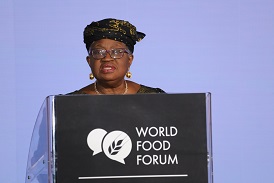Director-General of the World Trade Organization (WTO), Ngozi Okonjo-Iweala underscored the crucial role of trade and the WTO in addressing the challenges of farming and food security.
She made the remark speaking at the opening plenary of the World Food Forum on Monday in Rome, Italy hosted by the United Nations Food and Agriculture Organization (FAO). “A free, fair, open, and predictable multilateral trading system and modernized trade rules [provided by the WTO], is critical to building an agrifood system that can deliver good food to the world’s people today and in the future,” she emphasized.
“Trade has contributed to food security and resilience: For example, when the war in Ukraine cut off Ethiopia from its traditional source of wheat imports, the existence of deep and diversified global markets meant it could source from Argentina and the United States instead.,” she said.
The Director-General recalled the strengthened partnership between the WTO and the FAO in the areas of food and agriculture. She highlighted the WTO’s ongoing efforts to update trade rules, stressing that the multilateral trading system must be complemented by domestic policies that reduce distortions and enhance competition.
She pointed to the importance of “policies that provide essential public goods to farmers such as research, pest and disease control, efficient water management, and extension services that are needed to improve productivity and sustainability.”
“Beyond trade’s contribution to ensuring that food is available, trade-led growth and income gains have contributed mightily to bringing down hunger in countries including China, Indonesia, the Philippines, Thailand, and Vietnam, to name a few.”
She also indicated that agricultural production and consumption continues to be distorted by trade restrictions and subsidies.
His Majesty King Mswati III has urged UN Member States to move with accelerated speed (Nkwe!) in addressing the prevailing global food insecurity challenge. His Majesty has been speaking when addressing the World Food Forum in Rome, Italy, this afternoon. #WorldFoodForum2024 pic.twitter.com/pXOsJNfsmx
— Eswatini Government (@EswatiniGovern1) October 14, 2024
The Director noted that in 54 countries analysed by the OECD, support provided to individual producers averaged USD 630 billion per year from 2020 to 2022. This support often has environmentally harmful effects, encouraging the overuse of fossil fuels, energy and water.
“The distance between business as usual and truly sustainable food systems is considerable. The FAO has estimated that our current agri-food systems impose “hidden” health, environmental, and social costs equivalent to at least USD 10 trillion per year. Turning now to trade, the case for how it can help is straightforward: about one in four calories consumed is traded,” she said.
“Between 2000 and 2022, agricultural trade grew five-fold, rising across all world regions. [4] The average applied tariff on agricultural goods has fallen [5] from 13 percent in 2005 to just 5.8 percent in 2022, helping make food more affordable and available, while incentivizing exporters to ramp up production in response to international demand.”
She stated that the Global Commission on the Economics of Water, which she co-chairs, will issue a report later this week that highlights the role of ‘virtual water trade’ in agriculture, through the water used to grow or make a traded product. “It notes that trade can help mitigate water-related pressures, provided water’s price reflects its value and scarcity with targeted subsidies to those who cannot afford to pay, by allowing countries with abundant hydrological resources to specialize in producing water-intensive goods for export to water-scarce nations.”
“For example, there are export opportunities here for several African countries who have been found to have abundant and shallow under-utilized ground water resources as well as land resources, provided of course these resources are well and innovatively managed. In fact, based on these land and water resources, Africa not only can and should feed itself, using intra Africa food trade to manage supply and demand gaps but can also respond to external world demand.”
The Director also said: “The WTO provides a negotiating forum where members could lower trade barriers and reduce trade-distorting support, helping agricultural markets function better and freeing up billions of dollars’ worth of resources that could be put to better use. But the fact is that at a time when a comprehensive update to the global agricultural trade rulebook is long overdue, we have not been so successful in moving forward agricultural trade negotiations at the WTO. But we will never give up trying. Agriculture and a well- functioning agricultural trading system is too important to the world.”

